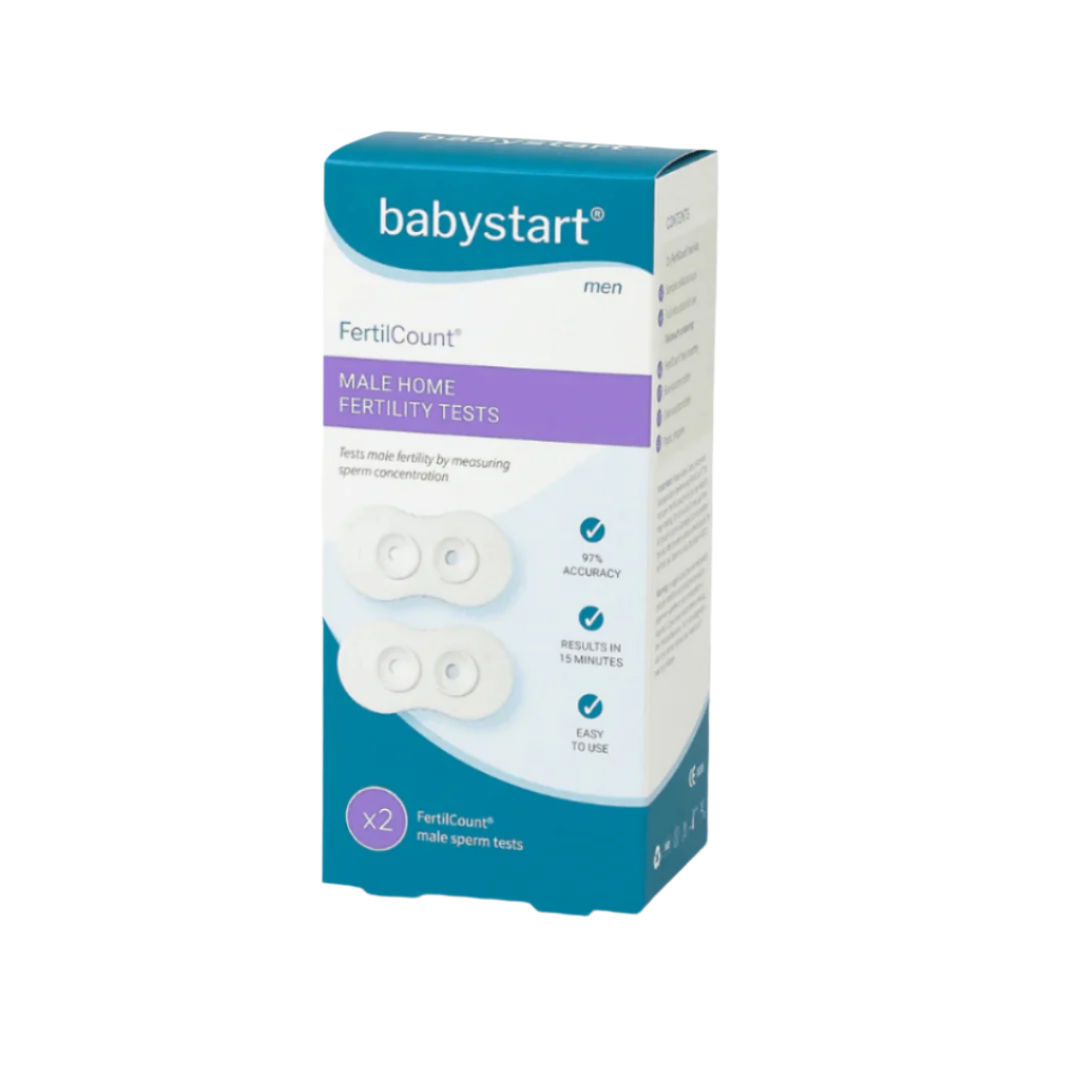The Journal
Cycle Tracking After the Pill: How to Understand Your Body Again
Coming off the pill is exciting, but it can also feel a little overwhelming. After years of your cycle being managed by hormones, you might be asking: When will my natural cycle return? How will I know if I’m ovulating? And what if I want to try for a baby soon? That’s where cycle tracking after the pill comes in. Understanding what’s happening in your body gives you clarity, reassurance, and confidence. And with the help of smart tools like Tempdrop , you can spot when ovulation returns and build a clear picture of your fertility—without the stress. Let’s break down what to expect after stopping the pill, why cycle tracking matters, and how to use Tempdrop to get reliable insights. What happens to your cycle after stopping the pill? The pill works by stopping ovulation. When you stop taking it, your body needs time to find its natural rhythm again. For some people, ovulation returns immediately. For others, it can take months. Common experiences include: Irregular or unpredictable cycles Lighter or heavier bleeding than expected PMS or cramps that feel stronger than you remember Not knowing whether or not you’ve actually ovulated This is exactly why cycle tracking after the pill is so helpful. Instead of guessing, you can see what’s really happening. Why Cycle Tracking After the Pill is so Valuable Whether or not you’re ready to conceive right away, cycle tracking after the pill gives you important information: Confirming ovulation – You’ll know whether your cycles are fertile again. Spotting irregularities – If ovulation is delayed or cycles are very long, you’ll notice it early. Reducing stress – No more second-guessing whether your period is “normal” or not. Planning ahead – When you’re ready to try for pregnancy, you’ll already understand your fertile window. And while you can track things like cervical mucus and cycle length, temperature is one of the most reliable signs of ovulation. That’s where Tempdrop comes in. How Tempdrop Makes Cycle Tracking Easier Traditional basal body temperature (BBT) tracking means waking up at the same time every morning, before moving, to take your temperature. Not exactly practical if you like sleep-ins, work shifts, or travel a lot. Tempdrop solves that problem. You wear it on your arm overnight, and it automatically records your temperature while you sleep. The app smooths out any “noisy” data and gives you a reliable chart of your cycle. For cycle tracking after the pill , this is a huge advantage. Even if your cycles are irregular or unpredictable, Tempdrop can still pick up when ovulation finally happens. Spotting ovulation with Tempdrop When ovulation occurs, progesterone rises—and with it, your body temperature increases slightly. When you start cycle tracking after the pill, Tempdrop identifies this subtle shift so you can see: If and when ovulation has taken place How long your luteal phase (the time between ovulation and your next period) lasts Whether your cycle is returning to a regular rhythm This is especially useful after coming off the pill, when you might not recognise your body’s other fertility signs right away. Building your Fertility Awareness Using Tempdrop for cycle tracking after the pill gives you a strong foundation, but it’s even more powerful when you combine it with other signs: Cervical mucus changes – Often the first signal that ovulation is approaching Cycle length – Logging start and end dates helps you spot trends over time Lifestyle notes – Stress, illness, and travel can all affect your cycle; tracking these factors alongside your data makes patterns clearer The more cycles you track, the clearer your personal fertility pattern becomes. Why This Matters if you're Thinking About Pregnancy You might not be ready to try for a baby tomorrow—but if kids are in your near future, cycle tracking after the pill puts you in control. If your cycles return quickly, Tempdrop confirms that you’re ovulating regularly. If your cycles are irregular, you’ll still know when your fertile window is happening. If ovulation isn’t showing up at all, you’ll have solid data to share with your doctor, saving time down the line. Rather than waiting and wondering, cycle tracking after the pill will help you have a clear picture of where your body is at. Common Worries (and How Tempdrop Can Help) Many people worry when their cycles don’t settle straight away. Here’s what’s normal: It can take months for ovulation to return after the pill. Tempdrop reassures you by showing small changes, even if cycles aren’t perfect yet. Cycles don’t have to be textbook, especially when you start cycle tracking after the pill. Ovulation can still happen in a 35-day cycle. Tempdrop helps confirm it, so you’re not left guessing. Professional support is available. If you’ve been cycle tracking after the pill for 6–12 months without signs of ovulation, you’ll already have detailed information to share with a healthcare professional. Be Kind to Yourself Coming off the pill and starting to think about pregnancy is a big moment. It’s easy to feel frustrated if your body doesn’t bounce back instantly. But remember: irregular cycles are normal at first, and patience really is part of the process. With Tempdrop and consistent cycle tracking after the pill, you don’t have to sit in the dark wondering. You’ll see progress, recognise patterns, and know your body better than ever before. The Bottom Line about Cycle Tracking after the Pill If you’ve just come off the pill and want to prepare for pregnancy in the near future, cycle tracking after the pill is one of the smartest steps you can take. And with Tempdrop , it’s easier, more accurate, and way less stressful than old-school BBT tracking. You’ll know if and when you’re ovulating, understand your fertile window, and have reliable data whether your cycles are regular, irregular, or still finding their rhythm. Because when it comes to fertility, knowledge really is power—and Tempdrop gives you exactly that. Laura Cartwright Laura Cartwright is one of the founders of femme health. Having worked in the diagnostics industry for over 15 years, Laura is passionate about improving women's health, to create an equitable and forward-thinking landscape which proactively supports health outcomes. Learn more
Learn moreWhich Fertility Supplement Is Right for You? A Deep Dive into Proceive Max, Artah Enhanced Fertility, Proceive Women, and Ovum
When you’re trying to conceive, choosing a fertility supplement can feel a bit like online dating; lots of promising profiles, plenty of attractive qualities, but which one is truly “the one” for you? To help cut through the noise, we’ve compared four popular choices; Proceive Max Women, Artah Enhanced Fertility, Proceive Women, and Ovum (Time to Conceive) so you can see how they stack up in terms of ingredients, focus, and best-fit scenarios. Let femme help you to choose the best fertility supplement; we're here to make you feel supported and empowered on your fertility journey. Proceive Max Women: The All-Rounder for Maximum Support If you’re over 35, have been trying for at least 12 months, or simply want the most comprehensive formula on the shelf right now, Proceive Max is like the deluxe, fully-loaded fertility supplement model. What’s inside: A broad amino acid profile (L-Arginine, L-Carnitine, L-Citrulline, L-Glutamine and more) High antioxidant support (CoQ10 70 mg, Vitamin C 400 mg, Vitamin E 200 mg) Methylated folate for optimal supplement absorption A generous spread of minerals (Zinc, Selenium, Magnesium, Calcium, Iron) Why choose it: Best suited for women 35+ or those who’ve been trying to conceive for more than a year Offers the widest nutrient coverage, including lesser-seen amino acids that can support egg quality and hormonal balance Ideal if you prefer a one-and-done fertility supplement sachet rather than multiple pills Artah Enhanced Fertility: The Nutrient Powerhouse with a Wellness Edge Artah’s Enhanced Fertility feels like the “nutritionist-approved” fertility supplement choice, with not just the standard fertility nutrients, but also a whole squad of plant compounds and eye-health carotenoids (hello lutein and zeaxanthin). What’s inside: Choline for cell membrane and brain development support CoQ10 and Alpha Lipoic Acid for mitochondrial and egg health A broad vitamin/mineral base including Vitamin K2, Magnesium, Iodine, and Methylated B vitamins Antioxidants like lutein and zeaxanthin, which may also protect reproductive cells from oxidative stress Why choose it: Great if you’re looking for a fertility supplement that doubles as a comprehensive wellness multi-vitamin Perfect for those who like the idea of additional phytonutrients alongside fertility supplement basics Good choice if you want long-term nutrient coverage from preconception through early pregnancy Proceive Women: The Balanced Starter for Under-35s Think of Proceive Women as Proceive Max’s younger and more relaxed sister; a little lighter on the extra ingredients, but still well-equipped to support fertility and conception for those who don’t need the “max” fertility supplement approach. What’s inside: Core amino acids like L-Arginine and L-Carnitine (lower doses than Max) CoQ10 at a moderate 25 mg Methylated folate, iron, zinc, selenium, and a range of B-vitamins Balanced antioxidant and mineral profile Why choose it: The best fertility supplement for women under 35 with no known fertility concerns Ideal if you want targeted fertility nutrition without going overboard A more budget-friendly fertility supplement option while still covering all key fertility nutrients Ovum (Time to Conceive): The Antioxidant Heavy-Hitter If your fertility focus is all about egg quality, Ovum is the fertility supplement equivalent of a targeted treatment plan. It’s antioxidant-rich, with particular emphasis and research on mitochondrial health and protecting egg cells from oxidative damage. What’s inside: CoQ10 at an impressive 200 mg — one of the highest doses available on the market Alpha Lipoic Acid (600 mg) and N-Acetyl Cysteine (600 mg) for cellular protection Methylated folate, Vitamin C, Vitamin E, zinc, selenium, and other essential fertility nutrients Why choose it: Ideal fertility supplement if you want maximum antioxidant support for egg health Particularly relevant for women over 35, those with a known diminished ovarian reserve, or where oxidative stress is a concern (e.g. certain fertility conditions) A strong choice if you’re already taking a general multivitamin and just want a fertility-focused antioxidant boost How to Choose Between Them Your choice of fertility supplement will come down to your age, fertility history, and personal priorities: 35 or older / TTC for 12+ months: Proceive Max or Ovum are your strongest contenders Looking for a whole-body wellness formula: Artah Enhanced Fertility Under 35 with no known issues: Proceive Women Focused purely on egg quality: Ovum It's important to remember that most fertility supplements offer the building blocks you need for conception and pregnancy; but there are some key differences which mean a particular fertility supplement might work better for your specific fertility journey. Final word on Choosing a Fertility Supplement: Supplements aren’t magic bullets, but the right formulation can help ensure your body has everything it needs to support conception. Whichever fertility supplement you choose, pair it with a balanced diet, good sleep, regular movement, and stress management — because no capsule can replace a healthy lifestyle. Laura Cartwright Laura Cartwright is one of the founders of femme health. Having worked in the diagnostics industry for over 15 years, Laura is passionate about improving women's health, to create an equitable and forward-thinking landscape which proactively supports health outcomes.
Learn moreThe Perfect Storm: When Your Menopause Meets Her Puberty
An interview between femme and Grace Gordon, founder of FluxxBox Grace, you’ve coined the term “the perfect storm” when talking about menopause and puberty clashing in the same household. Can you explain what you mean by that? "Absolutely. The “perfect storm” is when a mother is going through perimenopause or menopause at the exact time her daughter is starting puberty. It’s this collision of two intense hormonal life stages, one where your oestrogen levels are dropping, and one where hers are skyrocketing. Imagine mood swings, irritability, anxiety, and sleeplessness… on both sides. It’s not just a challenge for our bodies, but for family relationships too." Why do you think this is becoming more common? "There are two main reasons. First, puberty is starting earlier than ever. Second, more women are having children later in life. If you had your daughter in your mid-to-late thirties, by the time she’s hitting puberty, you may be entering perimenopause. So while she’s finding her identity and pushing for independence, you’re trying to navigate the emotional and physical changes that menopause brings. It’s a hormonal overlap that’s not just inconvenient, it can feel overwhelming." What does that actually look like day-to-day? "On a daily basis, it can mean there’s a lot more tension in the house. She’s pulling away because that’s what teens do, she needs to develop her own identity, but at the same time she still needs you as her safe place. Meanwhile, your own hormonal shifts during menopause might make it harder to stay calm, patient, and resilient. You might find yourself snapping more easily, or feeling emotional for no obvious reason. Suddenly there’s a lot more shouting, door slamming, and sometimes even silent standoffs." That sounds exhausting. How do mothers begin to “weather the storm”? "The first step is awareness. Recognise what’s happening, both in your body and in hers. Notice your triggers and be honest about them. When you feel your stress levels rising, try to pause and take deep breaths. Remind yourself that you’re both riding an emotional rollercoaster." Should mothers talk openly to their daughters about menopause? "Yes, but with sensitivity. They may be open to talking about it or may not be in the headspace to hear about your experience at the moment. You could say something like, “I’m going through menopause right now, and my emotions can be a bit all over the place, kind of like what you’re feeling.” This normalises hormonal changes and helps her see that emotions are a natural part of our life cycles. It’s about creating space for mutual understanding." How important is shared activity in this? "Incredibly important. Shared activities create non-confrontational opportunities to connect, (where the focus isn't Puberty or menopause). Exercise together, cook together, or have those brilliant conversations in the car when you’re not making direct eye contact, those can be surprisingly honest moments." Let’s talk about self-care for mothers. Why is that so critical during menopause? Because you cannot pour from an empty cup. If you’re running on fumes, your patience, emotional regulation, and resilience will suffer. During menopause, prioritising good sleep, balanced nutrition, and stress management isn’t indulgence, it’s survival. And your daughter is watching. She learns emotional regulation by seeing you regulate your own. You’ve mentioned that menopause and puberty clashing doesn’t have to be purely negative. How so? Exactly. While being in the middle of The Perfect Storm can feel like chaos, it’s also an opportunity for deeper connection. You’re both going through hormonal transformations, just at opposite ends of the spectrum. You can empathise with her on a unique level, because you understand what it’s like to have your hormones driving your emotions. This can make you a more compassionate and insightful guide for her. Many parents worry about getting “the period talk” right. How can they take the pressure off? That’s why I created FluxxBox, the complete first-period confidence kit. It gives parents a practical, thoughtful way to prepare their daughters for their first period, without the stress of wondering if they’ve covered everything. Menopause can make you feel emotionally and mentally drained, so having a tool that’s ready-made for this milestone can be a lifesaver. What’s inside a FluxxBox? Everything a girl needs to feel confident and prepared, feel-good treats, age appropriate and holistic educational materials, and things to make her feel supported. It’s about giving her the knowledge and tools she needs, so her first period and her cycles are something she understands for life, not something she fears. You’ve spoken about conversation being the starting point for confidence. How does that tie in with your mission? Confidence starts with knowledge, and knowledge starts with conversation. Whether we’re talking about puberty or menopause, silence breeds anxiety. When we create open dialogue in our homes, we help our daughters see these changes as normal, healthy parts of life. For mums who think their daughter might be close to starting her period but aren’t sure, do you have any resources? Yes, we have a free quiz designed for parents to take alongside their daughters. It helps you spot the signs that puberty is progressing and estimate when her periods might begin. It only takes five minutes, but it can make a huge difference in feeling prepared. And during menopause, when your struggling with things like brain fog, a clear, structured tool can be incredibly reassuring. What’s your final piece of advice for mums in menopause navigating this “perfect storm”? Give yourself grace. You’re managing menopause and parenting a child through puberty, and that’s no small feat. Don’t try to be perfect. Focus on connection over perfection. Take breaks when you need them. And remember that both you and your daughter are learning how to navigate big life changes, side by side. Want more support for your daughter? Follow @fluxxbox on Instagram to become part of our growing community of parents and carers all looking for the best way to give their daughters a positive start to their periods. And don't forget to sign up to FLOmail, your weekly dose of period knowledge, advice and trending teen news. For more support for you and menopause follow @femmehealthstore on Instagram where we share our real advice and honest thoughts on our hormonal fluctuations. And sign-up to the Know Your Flow newsletter to get your monthly dose of woman to woman support directly to your inbox. Grace Gordon Grace Gordon is the founder of FluxxBox and mum to two daughters. After her own fertility struggles, she's on a mission to ensure the next generation has a positive start to their period journey and a lifelong understanding of their amazing bodies.
Learn moreAmy Hart Fertility Journey: From Love Island to Welln
Before she was lighting up our screens with this years Love Island commentary, Amy Hart was sitting down with us at femme to talk about something even closer to her heart: women’s health, her fertility journey, and the power of community. It’s been a whirlwind few years for Amy, from freezing her eggs, finding love, welcoming her first baby, and now preparing for baby number two, all while championing a more open, supportive conversation around women’s wellness. As we watch her pop up in Love Island discussions this season, we couldn’t help but look back on that very first interview and reflect on how far she, and our shared mission have come. Looking back: Amy Hart's fertility journey with femme When Amy first walked into femme HQ, she was exactly what you’d hope for in a brand ambassador: warm, authentic, and genuinely passionate about our mission. There was no “TV persona” front; just Amy, ready to talk openly about her own fertility journey and why women deserve better access to information, products, and support. “Navigating fertility can feel like having 50 tabs open on your browser,” Amy laughed. “It’s overwhelming. But finding a place like femme Health, where everything is in one place, is such a relief.” That was the moment we knew we’d found the perfect partner. Life after Love Island For many, Amy Hart is first and foremost “Amy from Love Island”, the bubbly contestant whose honesty and humour won fans back in 2019. But away from the reality TV spotlight, Amy’s focus has shifted towards family life, her ongoing fertility journey, and advocating for fair access to reproductive healthcare. This year’s Love Island season has once again put her in the public eye, with her quick wit and candid takes on the show making headlines. But Amy hasn’t let the TV buzz overshadow her work in women’s health, in fact, she uses the increased attention to shine a light on topics many people shy away from discussing. “Love Island gave me a platform,” she says, “and I want to use it for more than entertainment. Women’s health, their fertility journey's, and community matter to me and they deserve to be talked about.” The fertility grant postcode lottery One of Amy’s biggest passions, and one of the first issues we discussed is the inequality in fertility grant access across the UK. The so-called “postcode lottery” means your chance of receiving funding for IVF or other fertility treatments can vary dramatically depending on where you live. “It’s incredibly unfair,” Amy told us. “Your location shouldn’t determine whether you can start a family. Partnering with femme made sense because they’re committed to changing that, not just talking about it, but actively supporting organisations like The Fertility Foundation.” At femme, we have committed to donate a portion of our marketing income to help fund fertility grants nationwide. It’s part of our mission to ensure that every woman, no matter her postcode, has the chance to access the care she needs, for her fertility journey. How Amy uses femme today Fast forward to now, and Amy’s life is busier than ever. Between looking after her son Stanley, and keeping up with her Love Island commentary, any many other projects she still makes time to prioritise her health. “I’ve switched to organic period products, I’m taking fertility supplements in preparation for baby number two, and I’m constantly checking the site for new articles and advice, to support me on my fertility journey” she says. “It’s become part of my routine, not just for me, but for my family’s future.” And that’s the beauty of a holistic approach to women’s health: it’s not just about solving one problem, it’s about building a lifestyle that supports you at every stage. Looking ahead together As we reflect on that first meeting with Amy Hart, it’s clear that our partnership has grown into something much more than a brand collaboration. It’s a shared mission to make women’s health more transparent, accessible, and supported from Love Island fans discovering Amy’s story for the first time, to women actively looking for fertility resources. This Love Island season might have been full of twists, turns, and dramatic re-couplings, but one thing remains constant: Amy Hart’s commitment to empowering women through open conversation and reliable resources. Why stories like Amy’s matter When we first published Amy Hart’s fertility journey, we were overwhelmed by the number of women we met who shared their own experiences. Some were just starting to research fertility supplements in the UK, others had been through IVF, and many were looking for emotional support from people who truly understood. This is why telling stories like Amy’s matters so much. Celebrities often share snapshots of their lives on social media, but when someone with Amy’s platform talks openly about topics like egg freezing, the fertility grant postcode lottery, or the importance of organic period products, it normalises the conversation for everyone else.And normalising is just the start, information empowers action. For example, women who discover Amy’s Love Island background might click through out of curiosity, but they leave with valuable advice about preparing for conception, understanding their fertility options, and finding trustworthy products. At femme, our mission goes beyond selling supplements or menstrual care products. We want to create a space where women can find accurate resources, connect with others, and feel confident in the choices they’re making for their health and future. Amy Hart’s fertility journey is just one of many we’re proud to share, and we hope it inspires more women to speak openly, seek the right support, and take charge of their wellness journey. Join the femme community Whether you’re taking your first step on the fertility journey, or simply looking for a trusted source of women’s health advice, we’re here to support you, just as we supported Amy from the very beginning. Explore our full range of supplements, Tempdrop fertility tracking device, and expert-led resources today.
Learn moreFertility Tracking: From 1920s BBT to Modern Wearables
It’s funny how some things in life never really change they just get better accessories. Back in the 1920s, when women wore cloche hats and jazz was the soundtrack of the city, an unlikely wellness trend was quietly beginning: Basal Body Temperature tracking. That’s right, while the rest of the world was dancing the Charleston, some women were waking up at the same time every morning, taking their temperature, and scribbling it down in careful little charts, all in aid of fertility tracking. Fast forward a century, and here I am, in my favourite pyjamas, not a cloche in sight tracking my own BBT… except my thermometer is now a sleek little wearable called Tempdrop, syncing my fertility tracking data to my phone while I sip my oat milk latte. Technology may have changed, but the principle? It's still the same as the flapper era. So how did we get from delicate glass thermometers to an wearable fertility tracking? Let’s take a trip back through time. The jazz age awakening: BBT in the 1920s The 1920s were all about liberation shorter skirts, bolder lipstick, and for some women, the first forays into self-knowledge about their cycles. Scientists had started to notice something fascinating: a woman’s body temperature subtly changes throughout her menstrual cycle. Your basal body temperature (that’s your temperature first thing in the morning, before moving or speaking) rises slightly after ovulation. And this was a huge innovation for fertility tracking. Armed with this discovery, a few forward-thinking women began to track these changes, slowly, methodically, and without the luxury of Google searches or cycle-tracking apps. They relied on glass thermometers and handwritten charts, recording daily temperatures to understand when they were most fertile. Imagine it: corsets might have been out, but patience and precision were still very much in fashion, and women were empowering themselves to understand fertility tracking. 1930s: The birth of charting for fertility tracking By the 1930s, BBT tracking had a name and a following. “Charting” (AKA fertility tracking), became the term for this process, and it was considered revolutionary. For the first time, women had a tangible, scientific way to understand their bodies no mysticism required. These charts were often works of art in themselves: neat grids, careful dots marking temperatures, little notes about mood or sleep. It was self-care decades before anyone was hashtagging it. And for many women, it was the first step toward realising that their fertility tracking didn't have to be a mystery it was a pattern. 1950s: BBT as the Gold Standard The 1950s were an era of domestic glamour, think immaculate hair, cinched waists, and housewives baking in spotless kitchens. But beneath that polished exterior, many women were running their own little home laboratories, and fertility tracking workshops. By this decade, BBT for fertility tracking was the go-to method for understanding fertility, long before ovulation kits or hormonal birth control existed. If you wanted to know when you were ovulating, you didn’t pop into a pharmacy for a plastic stick to pee on. You grabbed your thermometer, jotted down your reading, and compared it to last month’s. And here’s the thing, it worked. Thousands of women successfully used BBT to plan (or prevent) pregnancy, using nothing more than consistency and a bit of arithmetic, building their own bespoke fertility trackers in a note book! The long road to tech-savvy tracking Through the ‘60s, ‘70s, and ‘80s, fertility tracking using BBT kept quietly going strong. Women who wanted a natural approach swore by it. But let’s be honest, it wasn’t always glamorous. You had to wake up at the same time every day. You couldn’t move much before taking your temperature (forget about morning cuddles). And if you caught a cold, had a late night, or forgot to log one day well, your chart was basically toast. Still, this method of fertility tracking persisted because it was accessible, non-invasive, and empowering. And for many, it was the first step toward a deeper connection with their own health. Enter the digital era The 2000s brought us smartphones, apps, and an ever-expanding collection of wellness gadgets. Cycle-tracking apps were a game changer, suddenly, those handwritten grids could be replaced by clean, colour-coded digital charts. Helping women to better visualise their fertility tracking outcomes But the thermometers? Still kind of old-school. That’s where Tempdrop stepped in. This sleek wearable, worn overnight, automatically records your BBT while you sleep, adjusting for movement and environmental factors. In other words, no more strict wake-up times, no more morning juggling acts with a thermometer. Just effortless data that syncs right to your phone. Fertility tracking just go a lot easier. It’s the perfect marriage of a century-old method and modern convenience. Why the history of BBT still matters You might be wondering, why dwell on the past when the future of fertility tracking is already here? Because knowing the history reminds us of one simple truth: women have always sought to understand their bodies and fertility tracking plays a huge part in this. Long before pharmaceutical companies packaged fertility into neat monthly prescriptions, before algorithms predicted our ovulation days, there was curiosity, discipline, and the humble glass thermometer. BBT tracking is not just a method for accurate fertility tracking, it’s a legacy of women taking charge of their reproductive health, even in times when society didn’t always welcome that autonomy. From 1920s flappers to 2020s femtech queens When I put on my Tempdrop before bed, I’m part of a lineage that stretches back to women in the 1920s, women who probably never imagined that their quiet morning ritual would one day be supported by wearable tech and cloud-based data storage, helping women all over the world with their fertility tracking. In a world of quick fixes and instant answers, there’s something romantic about using a fertility tracking method that’s endured for a hundred years, only now, it’s paired with the convenience we’ve been dreaming about since those first handwritten charts. Your cycle, your story If there’s one thing history teaches us, it’s that your cycle is unique, but your challenges with fertility tracking aren’t new. Women have been there, done that, and left you a century of tips, from glass thermometers to the wonders of Tempdrop. So maybe tonight, when you slip into bed, you’ll think of those women in the 1920s and beyond, pen in hand, fertility tracking away under a single lamplight. And maybe you’ll smile knowing that, thanks to modern tech, you can carry on their tradition without sacrificing sleep, or style. Ready to start your own BBT journey? If you’ve ever wanted to take control of your fertility tracking, track your cycle with precision, or simply get to know your flow better, BBT fertility tracking is the time-tested way to do it. And with Tempdrop , it’s finally as effortless as it should be. Because your great-grandmother might have had patience, but you? You have Wi-Fi.
Learn moreWhy I’m so excited we’re stocking Artah supplements for women's health at femme
femme is excited to welcome Artah, a British, female‑founded brand creating science‑backed supplements that support women’s health, helping you know your flow and feel balanced, energised, and in control.
Learn moreDon’t tell me what to do with my boobs | World Breastfeeding Week
World Breastfeeding Week, the femme way Can we just say it? Breastfeeding is one of those topics that comes with an absolutely unnecessary amount of performance anxiety. There’s the guilt, the unsolicited opinions, the “have you tried nipple shields?” crowd, and the occasional emotional breakdown in the middle of a Tesco car park. And honestly? It’s a lot.So, this World Breastfeeding Week, we’re not here to give you a perfectly curated how-to. We’re here to say:You’re allowed to take it one feed, one pump, one panic Google at a time. Every journey is different (because every body is different) At femme, we talk a lot about knowing your flow - but that doesn’t stop at periods. Your postpartum flow matters just as much. Some women breastfeed with ease. Others struggle, switch to formula, mix feed, pump, cry, try again, give up, and then feel guilty about it all. Spoiler: all of that is normal. What works for you might not be what your friend did. What worked yesterday might feel impossible today. And what you need tomorrow might surprise you. But that’s not failure. That’s motherhood. Let’s stop romanticising it (and start supporting it) Sure, breastfeeding can be beautiful and bonding and magical. But breastfeeding can also feel like having a small, unpredictable piranha attached to your chest at 3am. We want to be real about the both/and: You can love your baby and still hate breastfeeding. You can choose formula and still be an incredible mother. You can breastfeed for two years and still have hard days where you resent every second. You’re allowed all of it. And you’re doing better than you think. Breastfeeding: the messy middle no one talks about Breastfeeding gets talked about like it’s either a magical bonding moment or a total nightmare. The reality? Most of us are somewhere in the sticky, leaky, slightly‑sweaty middle. It’s not just about “feeding your baby naturally”, it’s about suddenly living in a body that feels both miraculous and slightly out of your control. It’s the cracked nipples, the stone‑hard engorgement, the uninvited let‑downs (AKA milk ejection reflex), in the middle of a Zoom call. It’s leaking through your top at brunch and wondering if you’ll ever wear a non‑padded bra again. It’s loving the closeness one second and silently counting down until the latch is over the next. And the opinions? Oh, they will come. Nurse in public? Someone will tell you to cover up. Switch to formula? Someone will gasp. Combination feed? Congratulations, you’ve managed to upset both camps. Truly, you cannot win, so why are we still trying? Breastfeeding is wildly personal. Some people feed exclusively from the breast for years. Some pump like it’s a full‑time job. Some manage a few weeks before their mental health waves a white flag. All of these are valid. All of these are motherhood. It’s okay if you use a nipple shield. It’s okay if you don’t. It’s okay if you feed lying down at 2am because your spine is giving up on you. It’s okay if you stop altogether. You do not owe anyone a timeline, an explanation, or a photo‑worthy moment. And no, breastfeeding is not free. It costs time, sleep, energy, and often, a solid chunk of your sense of bodily autonomy. That’s why support matters. Not just “You’re doing great!” texts (though we love those), but the hands‑on kind. Someone to bring you water, make you lunch, or take the baby so you can shower. Someone to say, “If you stop, you’re still an amazing mum.” So if you’re in the thick of it this World Breastfeeding Week, whether you’re loving it, hating it, or living somewhere in‑between ,hear this: your worth as a mother has nothing to do with how, or how long, you breastfeed. You are already enough.And you health and wellbeing is part of this journey too. Why we care (even if we’re not a baby brand) We’re not selling bottles, bras, or breast pumps. But femme is here for women at every hormonal milestone - and trust us, postpartum is one hell of a milestone. Whether you’re three weeks in or three years out, your hormones, body, energy and identity are going through something massive. And you deserve more than platitudes or Pinterest advice. You deserve community, honesty, and support without strings. Some femme-approved reminders (just in case you need them today) Fed is best. Full stop.Don’t let anyone’s feed (online or otherwise) convince you otherwise. Your body has done enough.However you fed your baby today - bottle, breastfeed, both - that’s enough. So are you. Hormones are real and ruthless.Crying over spilled milk (literally)? Blame the prolactin. And maybe get some chocolate. Rituals can save you.Five minutes of skincare. A supplement. A matcha. A slow walk. Tiny moments = survival. You’re not supposed to have this all figured out.You’re learning your baby and yourself, in real time. Trust the messy process. Final Thoughts (and a Virtual Hug from Us) I didn’t even get the choice to breastfeed my daughter, a very complicated birth took that away, so I wish we would stop judging and pressuring women that breast is best. (Stefanie founder) This World Breastfeeding Week, we’re not here to tell you how to feed your baby. We’re just here to remind you that you matter too. Your boobs aren’t public property. Your value isn’t in ounces. And your intuition is more powerful than any parenting book you’ve half-read at 2am. So wherever you’re at today, chest-feeding, bottle-prepping, or somewhere in-between, keep going. You’re doing motherhood your way. And at femme, we’re clapping (quietly, in case the baby’s asleep). ⬇ Click the image below to shop our breastfeeding feature, or head to our website page to learn more from our FREE resources.
Learn moreWhat Your Period Says About Your Health: Why Your Cycle Is More Than Just a Monthly Nuisance
Why Do We Still Treat Periods Like a Monthly Inconvenience? We get it. Periods can be uncomfortable, inconvenient, messy, and painful. But they’re also something more – something we’re not talking about nearly enough. Your menstrual cycle isn’t just a fertility tracker. It’s a vital sign – right up there with heart rate, blood pressure and temperature. When it’s regular and symptom-free, it’s often a sign that your hormones (and wider health) are in sync. And when it’s not? That’s valuable data, too. At Femme Health, we think it’s time to shift the narrative. Here’s what your period is really telling you – and why tuning in is one of the best things you can do for your health. Your Menstrual Cycle as a Vital Sign The American College of Obstetricians and Gynaecologists (ACOG) actually recommends that the menstrual cycle be considered a vital sign – especially for adolescents and young adults. Why? Because changes in your cycle can signal issues with: Hormonal health (think oestrogen, progesterone, cortisol and insulin) Thyroid function Nutrient deficiencies Chronic stress or poor sleep Underlying conditions like PCOS, endometriosis, or hypothalamic amenorrhoea In short: your period is your body’s monthly status report. If we only ever treat it as a nuisance to be ignored or medicated away, we miss key health clues. What a “Healthy” Cycle Actually Looks Like Every woman’s cycle is slightly different, but here’s what a healthy menstrual cycle generally includes: Cycle length: 21–35 days (measured from the first day of one period to the first day of the next) Bleeding duration: 3–7 days Flow: Moderate and manageable (not soaking through products every hour) Symptoms: Mild or manageable – not debilitating cramps, exhaustion, or mood swings Regularity: Predictable cycles, with only slight variations month to month If your period ticks these boxes most months, it’s usually a sign that your body is functioning well hormonally. But if things feel off? That’s not something to ignore – it’s a sign worth exploring. What Irregular or Problematic Periods Can Tell You Here are just a few ways your period can act as an early warning system: 1. Heavy or Prolonged Bleeding Could signal fibroids, endometriosis, or low iron levels – or be a sign your oestrogen is dominating without enough progesterone to balance it out. 2. Irregular or Missed Periods Common with stress, PCOS, thyroid disorders or under-eating. A missed period is often the body’s way of saying, “I don’t feel safe enough for reproduction right now.” 3. Painful Periods Mild cramps are normal – but if you’re regularly doubled over in pain, it could be a sign of endometriosis, adenomyosis, or inflammation. 4. Extreme PMS or Mood Swings Could be linked to hormone imbalances, blood sugar fluctuations or PMDD (a more severe form of PMS that affects mood regulation). Why Reframing the Conversation Matters We’ve been taught to treat periods like something to hide, hush or “power through.” But when we ignore our cycles, we miss out on one of the most useful health tools we have. Understanding your cycle helps you: Make more informed healthcare decisions Spot patterns in mood, energy, and sleep Advocate for yourself at the doctor’s office Feel more in control, not blindsided, by your body And when we all start treating menstrual health as essential health, we begin to dismantle the stigma that holds so many women back from seeking the care they deserve. The Bottom Line Your period is not just a monthly nuisance. It’s a messenger. A barometer. A beautifully complex signal from your body that’s worth listening to – not suppressing or silencing. At femme, we’re here to help you tune in, not tune out. Curious about what your period is telling you?Explore our cycle health tools or sign up to the femme newsletter for hormone-friendly insights, expert interviews, and zero-BS health advice.
Learn moreWhat is the Vaginal Microbiome - and Why Should You Care?
The Vaginal Microbiome: Not Just a Buzzword You’ve probably heard the term gut microbiome thrown around, but did you know your vagina has its own ecosystem too? It’s called the vaginal microbiome – and it’s more than just a trending topic in women’s health. This delicate balance of bacteria plays a key role in everything from infection prevention to fertility and hormone health. At Femme Health, we’re all about making the science make sense. So here’s what your vaginal microbiome actually does, what can throw it off, and how to support it without panic-Googling every time something feels “off.” What Is the Vaginal Microbiome? The vaginal microbiome is the community of microorganisms (mainly bacteria) that live in the vagina. Don’t worry – these aren’t the bad kind. In fact, many of them are there to protect you. The superstar of the vaginal microbiome? Lactobacilli. These friendly bacteria help keep the vagina slightly acidic (with a pH of around 3.8 to 4.5), which makes it hard for harmful bacteria, yeast, and viruses to thrive. Why the Vaginal Microbiome Matters When the microbiome is in balance, you’re less likely to experience: Recurring thrush or yeast infections Bacterial vaginosis (BV) Urinary tract infections (UTIs) Vaginal odour or discomfort Fertility struggles (yes, really) It also plays a role in immune defence, pregnancy outcomes, and even how well your body tolerates things like tampons, lube, and sex. What Can Disrupt the Vaginal Microbiome? Unfortunately, this ecosystem is pretty sensitive. Here are some common culprits that can throw things off: Antibiotics: While they kill bad bacteria, they can wipe out the good guys too. Douching or harsh soaps: Your vagina is self-cleaning. It doesn’t need scrubbing. Tight or synthetic underwear: Not great for airflow or moisture balance. Hormonal changes: Menstruation, pregnancy, perimenopause and HRT can all affect the microbiome. Sex (especially unprotected): Semen has a higher pH, which can temporarily disrupt balance. Stress and poor sleep: Yep, your vaginal microbiome is affected by your nervous system too. Signs Your Vaginal Microbiome Might Be Out of Whack If you notice any of the following, it could be a sign your balance is off: Persistent or recurrent thrush or BV Unusual discharge (especially if it smells “fishy” or is grey/green) Itching, burning, or irritation Increased UTIs or urinary discomfort That said, everyone's normal is different. If something feels new or uncomfortable, check in with your GP or sexual health clinic. How to Support a Healthy Vaginal Microbiome Good news: you don’t need to do anything drastic. In fact, less is often more. 1. Avoid Over-Cleansing No douching. No scented soaps. Just warm water externally, or a pH-balanced, fragrance-free wash if you prefer something extra. 2. Wear Breathable Underwear Cotton underwear and going commando at night can help reduce moisture build-up. 3. Practice Safe Sex Condoms can help protect your microbiome, especially if you’re prone to BV or UTIs after sex. 4. Consider Probiotics There’s growing research into vaginal-specific probiotics (like Lactobacillus crispatus) to help maintain balance – especially if you’ve recently taken antibiotics. 5. Support Your Overall Health A healthy gut, balanced hormones, and good sleep all contribute to a happy vaginal microbiome. Everything's connected. The Bottom Line: It’s Time We Talked About Vaginal Health More Openly Your vaginal microbiome isn’t something to be ashamed of or anxious about – it’s just part of your overall health. Understanding how it works empowers you to spot changes early, seek the right support, and take care of your body in a way that works with it, not against it. At Femme Health, we believe that vaginal health is just as important as mental health, menstrual health, or gut health. No shame. No stigma. Just straight-up support and science-backed advice.
Learn more
In The Press

Simplify Your Fertility Tracking with Tempdrop
Take the guesswork out of cycle tracking with Tempdrop, the smart wearable thermometer that fits seamlessly into your routine. Designed to learn your unique patterns, it provides accurate, reliable insights without the hassle of early wake-ups or daily charts.


















